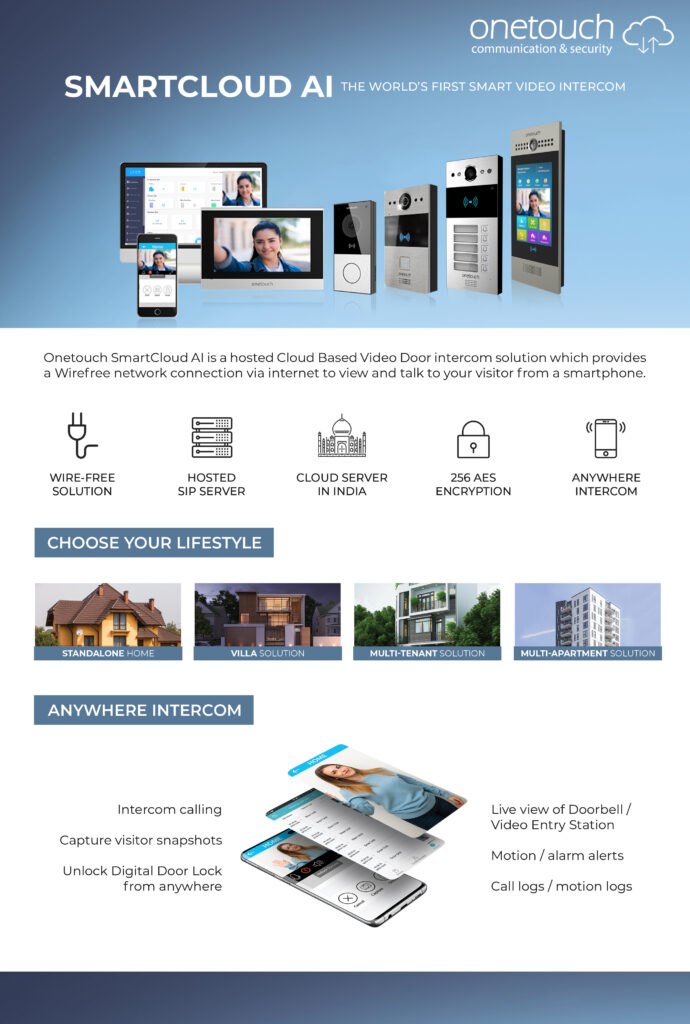Convenience, communication, and security – these are the cornerstones of a good home. Intercom systems deliver all three, but choosing between wired and wireless intercom systems can be tricky for homeowners. Both options have advantages and disadvantages. So, which one better suits your needs, a wired or wireless system?
Here, we’ll help you distinguish between wireless vs. wired intercom systems. We’ll go over the pros and cons of each so that you can choose the best intercom system for home.
What’s an Intercom System?
Before we get into the comparison of wired vs. wireless intercom systems, let’s try to understand what an intercom system is. An intercom system allows two-way communication within or even between buildings. It is used for security, convenience, and, of course, communication.
These intercom systems include microphones, speakers, and even cameras for video, enhancing security and ease of communication within your property. They are a valuable tool for managing access and internal communication.
Intercom systems come in two primary types: wired and wireless. The right choice depends on your home’s infrastructure as well as budget and security requirements.
Let’s discuss how each intercom system operates, along with its advantages and drawbacks, which will help you determine which system aligns best with your priorities.
Wired Intercom Systems
How Do Wired Intercom Systems Work?
Wired systems rely on physical cables, usually run through walls or ceilings, to create a direct link between all the parts. They connect the central control hub to indoor intercom stations. Having a physical connection ensures a consistent and uninterrupted communication flow throughout the system.
Pros of Wired Intercom
- Reliability: With signals travelling through cables, interference from other electronic devices or environmental factors is minimal. This makes them ideal for environments where reliability is non-negotiable.
- Built to Last: These systems are less affected by weather or external damage, especially when using concealed wiring. They can withstand harsh conditions and generally require minimal maintenance over time.
- Superior Communication: Wired systems are designed for high-quality audio and video transmission. Thus, it is perfect for professional as well as security-sensitive environments where the quality of communication cannot be compromised.
- High Security: Direct wired connections are less prone to being tapped by malicious attempts, making wired intercoms suitable for high-risk areas. They keep your sensitive information safe within the system.
Cons of Wired Intercom
- Complex Installation: Professional installation is necessary for wired intercom systems. Installing one often requires so, making it labour-intensive. The process typically involves cable routing, drilling, and extensive structural modifications.
- Limited Upgrade Path: Relocating or expanding a wired intercom system can be complicated after installation. It limits adaptability to changing needs or layouts.
- High Cost: The materials (especially the cables) and labour involved increase the initial investment. Future expansions or upgrades may also incur significant expenses.
Wireless Intercom Systems
How Do Wireless Intercom Systems Work?
Wireless systems use Wi-Fi, Bluetooth, or special radio frequencies such as Z-wave to connect the stations to the hub, eliminating the need for cables. This allows for easy setup and configuration, making them a popular choice for many homeowners and office spaces.
Pros of Wireless Intercom
- Easy to Install: No cabling means you can save on professional installation costs by setting up the system yourself. It’s a more DIY-friendly option.
- Relatively Affordable: Wireless systems are budget-friendly due to their comparatively lower costs. Moreover, their simplified installation makes them practical for those seeking a quick and affordable solution.
- Easy to Scale: Move or add devices easily—no need for rewiring. The seamless adaptability is a match for dynamic environments where needs are ever-changing.
- Smart Features: Many wireless systems offer mobile app integration and remote access, putting users in charge even when they’re away from home.
Cons of Wireless Intercom
- Communication Disruptions: Other wireless devices and obstructions, such as brick walls, often interfere with wireless signals. This results in poor signal strength and, in turn, reduced clarity and dropped calls. There might also be slight communication latency, especially in busy networks or peak usage times.
- Limited Range: Wireless systems might not effectively cover large areas. One may require additional repeaters or range extenders for better coverage and placement of intercom stations.
- Battery Dependency: Regular recharging or battery replacements are necessary for some devices, making them inconvenient for users who prefer minimal maintenance. That said, some systems offer a backup option for corded power.
- Security Risks: Wireless systems without proper encryption are more vulnerable to security breaches. They require more careful configuration for utmost protection.
Factors to Consider While Choosing Between Wireless vs. Wired Intercom Systems
When choosing between wireless vs. wired intercom systems, consider these factors:
Building Infrastructure
Wired systems are ideal for new constructions or major renovations where concealed cabling can be deployed without hassle. They are a long-term solution for properties with stable layouts.
Conversely, wireless intercoms are best for existing buildings or historic homes where drilling or extensive rewiring is not an option.
Upgrade Path
As mentioned, wired systems are less adaptable once installed. Wireless systems leave wiggle room for additions and alterations.
Communication Quality
Wireless systems are adequate for general home use. While interference and network congestion affect signal quality, slight drops will unlikely impact everyday applications. Wireless intercoms, due to their stable connection, generally provide superior call quality and are the better choice in demanding corporate environments.
Budget
Perhaps the most critical factor. Wireless systems are an affordable initial investment (thanks to the quicker installation) with potential ongoing maintenance costs. Wired ones are costly upfront but are more reliable over the long term.
Maintenance
Battery replacements and firmware updates for wireless intercoms mean more maintenance. While wired systems require less frequent maintenance, fixing a degraded cable hidden behind a wall can be more complex.
Also Explore: Impact of Smart Door Locks on Home Security Trends
A Brief Intercom System Installation Guide
If you’ve decided on an intercom system, here are some quick installation tips:
For Wired Intercom
- Plan the wiring layout during construction or renovation. Proper planning will minimise disruptions later on.
- Utilise high-quality cables like CAT5e or CAT6 for better performance and reliability. Investing in good materials reduces the likelihood of future replacements.
- Hire a professional installer to ensure proper connection. They can also help with system testing and troubleshooting.
For Wireless Intercom
- For Wi-Fi-based intercom, ensure robust network coverage throughout your home.
- Deploy the hub and stations strategically to minimise interference and maximise stability.
- Software updates often mitigate security exploits and introduce new features. Therefore, you should regularly update the firmware for better security and functionality.
Choosing the Perfect Intercom: Wired or Wireless?
Choosing between wireless vs. wired intercom systems depends on your needs. Wireless systems offer better reliability and security, whereas wireless systems are more scaleable and straightforward to install. Consider your budget, building structure, and essential needs, and you’ll be well on your way to selecting the perfect intercom system for your space.
FAQ (Frequently Asked Questions)
1. Can intercoms be hard-wired?
Yes, wired intercoms are hard-wired, using physical cables to connect each station. This makes them immune to interference and more resistant to tampering attempts than wireless systems. For the majority, the best intercom system for home is a hard-wired one. They are the superior choice if security and reliability are your top priorities.
2. How many wires do an intercom system need?
Basic systems require at least two wires for audio communication, whereas more advanced systems with video or other features will need additional wiring. For an intercom system installation guide specific to your needs, consult a professional installer who can access your requirements.
3. Can I integrate my intercom system with other smart home devices?
Many modern intercom systems, especially wireless ones, offer smart home integration with Google Home, Amazon Alexa, or Apple HomeKit. This unlocks many possibilities for home automation, including controlling the intercom with voice commands, receiving mobile alerts and notifications, and even integrating it with smart door locks.
4. What’s the typical lifespan of an intercom system?
Assuming it’s adequately maintained, a well-installed wired intercom system can last 10-15 years or even longer. Wireless systems, due to their reliance on more rapidly evolving technology, might have a slightly shorter lifespan, perhaps 5-10 years, before needing upgrades or even replacements in some cases.
Ready to upgrade your home’s communication and security? Start planning today!








